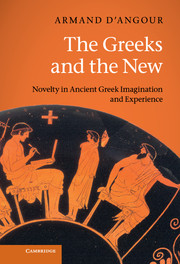Book contents
- Frontmatter
- Contents
- Acknowledgements
- Introduction
- Chapter 1 New, new, new
- Chapter 2 Loosening the grip of the past
- Chapter 3 The transformations of Kaineus
- Chapter 4 Old and new
- Chapter 5 Nothing new under the sun
- Chapter 6 The birth of Athena
- Chapter 7 Inventions of Eris
- Chapter 8 The newest song
- Chapter 9 Constructions of novelty
- Chapter 10 So what's new?
- References
- General index
- Index of Greek terms
- Index locorum
- References
Chapter 5 - Nothing new under the sun
Published online by Cambridge University Press: 07 September 2011
- Frontmatter
- Contents
- Acknowledgements
- Introduction
- Chapter 1 New, new, new
- Chapter 2 Loosening the grip of the past
- Chapter 3 The transformations of Kaineus
- Chapter 4 Old and new
- Chapter 5 Nothing new under the sun
- Chapter 6 The birth of Athena
- Chapter 7 Inventions of Eris
- Chapter 8 The newest song
- Chapter 9 Constructions of novelty
- Chapter 10 So what's new?
- References
- General index
- Index of Greek terms
- Index locorum
- References
Summary
There's nothing new except what has been forgotten.
Marie AntoinetteIt is not surprising that the Greeks should have been inclined, given the overwhelmingly agrarian context of their lives, to hold cyclical views of life and time. Despite the increasing urbanisation and interchange between city centres over the classical period, ancient thinkers appear to have been slow to embrace the possibility of radical, non-temporal novelty. Over this period, however, the notion that something may exceed natural, observable processes of change or recurrence, something that cannot be contained by or entertained in terms of what has gone before, is increasingly detectable in Greek thinking. In this chapter, I argue that some of the earliest occurrences of ‘new’ indicating ‘saliently different’ appear to be transmitted in observations by the philosophers Pythagoras and Herakleitos. The fragmentary remains of other early Presocratic thinkers yield few explicit references to the new; but their doctrines suggest an engagement with the idea of newness, and give pointers to how they thought about it. The eagerness of natural philosophers (phusikoi), for instance, to identify cosmic first principles (arkhai) points less to a preoccupation with the remote past than with the way new things may be imagined to emerge into being. At the same time, the challenge to the very possibility of newness from theories such as that of Parmenides demands a more complex perspective on early Greek views of novelty and their relationship to cyclical views of time.
The writings of later Presocratics (amongst whom are commonly included younger contemporaries of Sokrates such as Demokritos of Abdera, Hippias of Elis and Arkhytas of Taras) raise questions about the way new knowledge is thought to arise. ‘[People] thinking new thoughts day by day’, a tantalising quotation from Demokritos, appears to locate novelty and its generation within individual human minds rather than as emanating from some ‘outside’ source. At the same time, the notion that new ideas might be adopted from external sources, whether from beyond the human sphere or from outside the Hellenic context, is a recurrent theme in classical texts. By the fourth century, authors of heurematographic treatises were compiling lists of ‘first inventors’ and seeking to attribute a range of cultural innovations to divine beings or culture heroes of superhuman status. Foreign peoples with developed cultures were, or were thought to be, a fertile source of such novelty, a recognition summed up in the truncated proverb derived from the fourth-century comic poet Anaxilas, ‘Libya is always begetting some new thing.’ The most momentous contribution from the East was one of undisputed provenance: the Greek alphabet, derived from Phoenician script, became a uniquely successful and economical means of recording and transmitting Greek writings. The spread of written documents raised the stakes for those who might set out or claim to say something new. One could generate new ideas through observing, criticising and contesting established theories and practices; but at the same time, the accumulated record of thoughts and experiences might make it harder for something incontestably new to be found or created.
- Type
- Chapter
- Information
- The Greeks and the NewNovelty in Ancient Greek Imagination and Experience, pp. 108 - 133Publisher: Cambridge University PressPrint publication year: 2011



